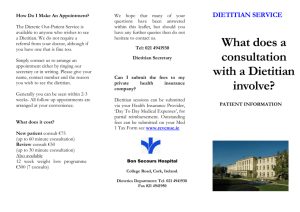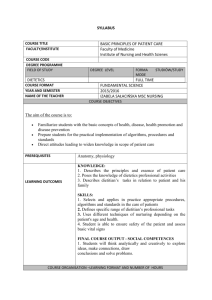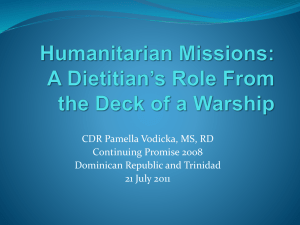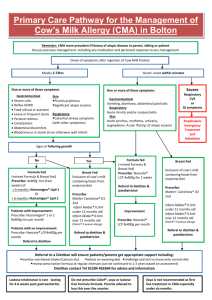Patient Experience of the Renal Dietetic Service in Pre
advertisement
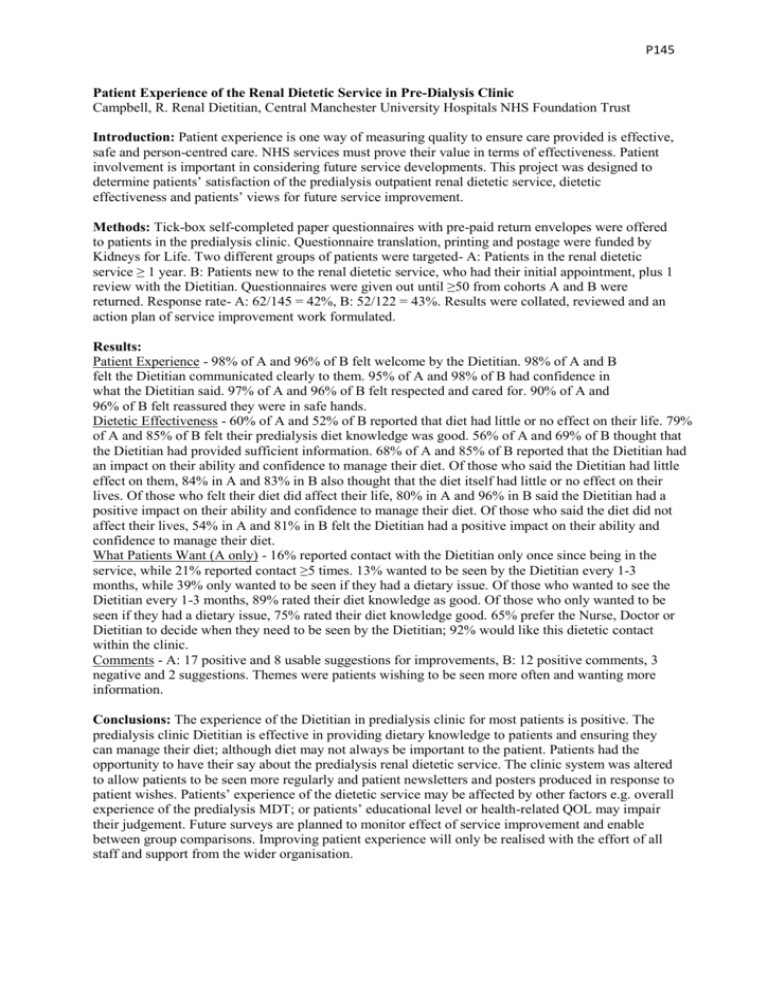
P145 Patient Experience of the Renal Dietetic Service in Pre-Dialysis Clinic Campbell, R. Renal Dietitian, Central Manchester University Hospitals NHS Foundation Trust Introduction: Patient experience is one way of measuring quality to ensure care provided is effective, safe and person-centred care. NHS services must prove their value in terms of effectiveness. Patient involvement is important in considering future service developments. This project was designed to determine patients’ satisfaction of the predialysis outpatient renal dietetic service, dietetic effectiveness and patients’ views for future service improvement. Methods: Tick-box self-completed paper questionnaires with pre-paid return envelopes were offered to patients in the predialysis clinic. Questionnaire translation, printing and postage were funded by Kidneys for Life. Two different groups of patients were targeted- A: Patients in the renal dietetic service ≥ 1 year. B: Patients new to the renal dietetic service, who had their initial appointment, plus 1 review with the Dietitian. Questionnaires were given out until ≥50 from cohorts A and B were returned. Response rate- A: 62/145 = 42%, B: 52/122 = 43%. Results were collated, reviewed and an action plan of service improvement work formulated. Results: Patient Experience - 98% of A and 96% of B felt welcome by the Dietitian. 98% of A and B felt the Dietitian communicated clearly to them. 95% of A and 98% of B had confidence in what the Dietitian said. 97% of A and 96% of B felt respected and cared for. 90% of A and 96% of B felt reassured they were in safe hands. Dietetic Effectiveness - 60% of A and 52% of B reported that diet had little or no effect on their life. 79% of A and 85% of B felt their predialysis diet knowledge was good. 56% of A and 69% of B thought that the Dietitian had provided sufficient information. 68% of A and 85% of B reported that the Dietitian had an impact on their ability and confidence to manage their diet. Of those who said the Dietitian had little effect on them, 84% in A and 83% in B also thought that the diet itself had little or no effect on their lives. Of those who felt their diet did affect their life, 80% in A and 96% in B said the Dietitian had a positive impact on their ability and confidence to manage their diet. Of those who said the diet did not affect their lives, 54% in A and 81% in B felt the Dietitian had a positive impact on their ability and confidence to manage their diet. What Patients Want (A only) - 16% reported contact with the Dietitian only once since being in the service, while 21% reported contact ≥5 times. 13% wanted to be seen by the Dietitian every 1-3 months, while 39% only wanted to be seen if they had a dietary issue. Of those who wanted to see the Dietitian every 1-3 months, 89% rated their diet knowledge as good. Of those who only wanted to be seen if they had a dietary issue, 75% rated their diet knowledge good. 65% prefer the Nurse, Doctor or Dietitian to decide when they need to be seen by the Dietitian; 92% would like this dietetic contact within the clinic. Comments - A: 17 positive and 8 usable suggestions for improvements, B: 12 positive comments, 3 negative and 2 suggestions. Themes were patients wishing to be seen more often and wanting more information. Conclusions: The experience of the Dietitian in predialysis clinic for most patients is positive. The predialysis clinic Dietitian is effective in providing dietary knowledge to patients and ensuring they can manage their diet; although diet may not always be important to the patient. Patients had the opportunity to have their say about the predialysis renal dietetic service. The clinic system was altered to allow patients to be seen more regularly and patient newsletters and posters produced in response to patient wishes. Patients’ experience of the dietetic service may be affected by other factors e.g. overall experience of the predialysis MDT; or patients’ educational level or health-related QOL may impair their judgement. Future surveys are planned to monitor effect of service improvement and enable between group comparisons. Improving patient experience will only be realised with the effort of all staff and support from the wider organisation.
